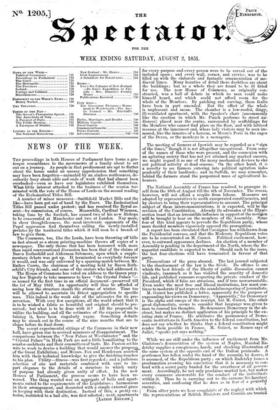The National Assembly of France has resolved to prorogue it-
self from the 10th of August till the 4th of November. The recess, however, will not afford a respite from labour. Measures are adopted by representatives to sooth exasperated constituencies, and by electors to bring their representatives to account. The principal subject of these haterrommunications, it is expected, will be tie revision of the Constitution. Already its advocates of the Flyste section boast that an irresistible influence in support of the revision will be brought to bear on the members of the Assembly. Some fear of this kind appears to pervade the Republican party, whose more decided members vigorously opposed the prorogation.
A report has been circulated that Cavaignac has withdrawn front the Presidential canvass, and that the Moderate Republican votes are to be concentrated on M. Carnet. Political excitement, how- ever, to outward appearance declines. An election of a member of Assembly is pending in the department of the North, where the Bo- napartist candidateis expected to win. Should such be the issue, the last four elections will have terminated in favour of that party. Prosecutions of the press abound. The last journal subjected to the chastisement of the law is the Sleek. Its offence is one which the best friends of the liberty of public discussion cannot vindicate, inasmuch as it has violated the sanctity of domestic life, and published rumours respecting the private conduct of the President, which if false are atrocious and if true unwarrantable. Even under the most free and liberal institutions, law must con- tinue to moderate if not repress the scandalmongering of journalists. M. Guizot has published a letter, apparently for the purpose of expounding his views on Democracy. "Apparently," for Democracy is the alpha and omega of the rescript, but M. Guizot, like other great diplomatists, seems to consider that language was given to man to conceal his thoughts. He denounces Democracy in the 'ab- stract, but makes no distinct application of his principle to the ex- isting state of France. He attributes the permanency of Demo- cratic institutions in North America to the federal constitution, but does not say whether he thinks that a federal constitution might render them possible in France. M. Guizot, as Romeo says of Juliet, "speaks yet says nothing."


























